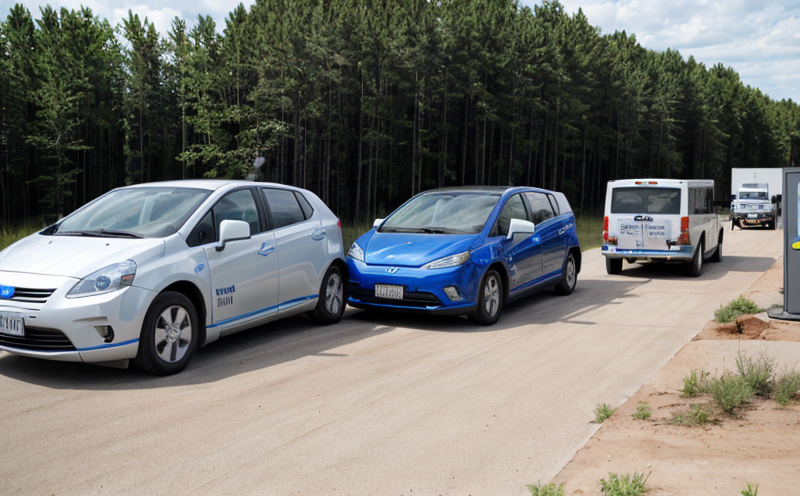IEC 60529 IP Protection Testing of Fuel Cell Systems
The International Electrotechnical Commission (IEC) standard IEC 60529 defines the degrees of protection which an enclosure provides against access to hazardous parts, and also against ingress of foreign objects and water. This standard is crucial for ensuring that fuel cell systems are protected from environmental factors that could compromise their performance or lifespan.
Fuel cells operate in harsh environments where they are exposed to various elements such as dust, rain, snow, and humidity. The integrity of the housing protecting these components directly impacts the overall reliability and efficiency of the fuel cell system. By adhering to IEC 60529, manufacturers can ensure that their products meet stringent IP (Ingress Protection) ratings, thereby providing robust protection against environmental hazards.
Our laboratory specializes in conducting comprehensive IEC 60529 IP protection testing for fuel cell systems across a range of IP ratings. We use state-of-the-art facilities and equipment to simulate real-world conditions that the fuel cells might encounter during their operational lifecycle. This includes humidity tests, dust ingress tests, water resistance tests, and more.
The testing process involves subjecting the fuel cell system to controlled environmental conditions designed to replicate exposure to specific IP ratings (e.g., IPX1, IPX2). Our team meticulously documents every aspect of the test procedure and result for thorough analysis. Post-testing, detailed reports are generated which include a comprehensive summary of findings, pass/fail criteria adherence, and recommendations for improvement if necessary.
By ensuring compliance with IEC 60529 standards through rigorous testing, manufacturers not only enhance product quality but also contribute significantly towards establishing trust among consumers regarding the durability and longevity of their products. This is particularly important in sectors like renewable energy where reliability forms a cornerstone of success.
In summary, performing IEC 60529 IP protection tests on fuel cell systems ensures that these critical components are adequately protected against environmental aggressions. Such rigorous testing helps manufacturers meet regulatory requirements while enhancing product performance and customer satisfaction.
Quality and Reliability Assurance
The importance of quality assurance cannot be overstated in the development and production of fuel cell systems. Our laboratory takes a proactive approach towards ensuring that all products meet stringent IP protection standards set forth by IEC 60529.
We employ cutting-edge testing methodologies to evaluate the durability and robustness of fuel cells under various environmental conditions. This includes but is not limited to humidity tests, dust ingress tests, water resistance assessments, and more. Our rigorous testing procedures aim at identifying any weaknesses or vulnerabilities in the design that could lead to failures.
Our team consists of highly skilled professionals who possess extensive experience in fuel cell technology and IP protection standards. They work closely with clients throughout the entire testing process to provide expert guidance and support. From initial consultation regarding test requirements, through execution of tests, up until final report generation, our goal is always to offer unparalleled service.
Once completed successfully, these tests serve as proof points that demonstrate adherence to IEC 60529 standards. These certifications are invaluable assets when marketing products internationally or seeking government grants for sustainable projects involving fuel cells.
In conclusion, investing in IEC 60529 IP protection testing is an essential step towards maintaining high levels of quality and reliability within your organization's operations related to fuel cell systems.
Use Cases and Application Examples
The application scenarios for IEC 60529 IP protection testing in fuel cells are vast and varied. One common use case involves outdoor installations such as remote power generation sites, where continuous operation is crucial despite adverse weather conditions. Another scenario includes portable devices used by emergency services personnel who need reliable communication equipment even under challenging environmental circumstances.
For example, a company developing an off-grid hydrogen fuel cell system for rural areas would benefit greatly from undergoing IP protection testing according to IEC 60529. By doing so, they can confirm that their product will function correctly regardless of whether it's exposed to heavy rainfall or dusty environments.
Similarly, companies manufacturing portable emergency communication devices could use these tests to ensure that their products remain operational during natural disasters when normal infrastructure is compromised. In both cases, compliance with IEC 60529 ensures not only regulatory adherence but also enhanced user experience by providing dependable performance in diverse settings.
The benefits extend beyond just meeting legal requirements; they also contribute positively towards brand reputation and customer satisfaction. Consumers appreciate knowing that the products they purchase have undergone thorough testing to ensure their functionality under all relevant conditions.
Why Choose This Test
- Comprehensive Environmental Protection Assurance: Our laboratory ensures that fuel cell systems are protected against dust, water, and other environmental hazards using IEC 60529 IP ratings.
- Regulatory Compliance: Adherence to international standards such as IEC 60529 guarantees compliance with global regulations for quality assurance.
- Enhanced Product Reliability: By conducting these tests, manufacturers can ensure higher reliability and longer operational life of their fuel cell systems.
- Innovation Facilitation: Rigorous testing allows R&D engineers to refine product designs based on real-world performance data.
- Customer Trust Building: Compliance with IEC 60529 standards enhances customer confidence in the durability and longevity of fuel cell systems.
- Sustainable Practices: Ensuring robust protection against environmental factors supports sustainable practices by reducing replacement rates due to premature failure.
- Cost Efficiency: Early identification of potential issues through testing can save costs associated with post-market recalls or repairs.
- Global Market Access: Meeting international standards opens doors for manufacturers aiming to penetrate global markets, especially in competitive sectors like renewable energy.





